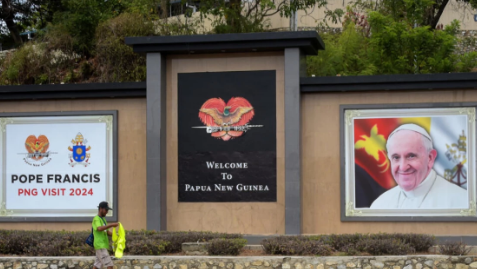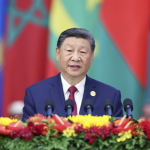Across mountains, by air, and by sea, pilgrims have converged on Port Moresby, the capital of Papua New Guinea, where Pope Francis arrived late Friday for a historic visit. The 87-year-old pontiff will spend four days and three nights in one of the Pacific’s poorest and most troubled nations, where he will address politicians and bishops, meet street children, and travel to the remote jungle outpost of Vanimo.
He will also celebrate mass for tens of thousands of faithful in the capital, including people like Josephine Gofeau, who see his visit as a “blessing” that has brought “peace and harmony” to a country in dire need of both.
The once-dusty roads have been cleaned, street vendors have been cleared away, and yellow-and-white Vatican flags now flutter from lampposts in the warm Coral Sea breeze.
Among the gathered crowds are 43 pilgrims who made the journey on foot from the north coast to the south, traversing dense jungles and the formidable central mountain range—a trek that took weeks rather than days.
For others, the journey was less physically demanding but no less transformative. Sophie Balbal traveled from the island of New Britain to represent a group of mothers.
“This is the very first time in my life to travel on a plane and to come to Port Moresby,” she told AFP excitedly.
“Whatever message he passes on to us, I will try my best to pass it on to my fellow mothers, all the mamas in our parish.”
Social Ills
Papua New Guinea, despite being deeply Christian, grapples with poverty, widespread domestic abuse, violent witch hunts, and deadly tribal conflicts that have claimed thousands of lives and displaced tens of thousands. Human Rights Watch has labeled Papua New Guinea “one of the most dangerous places to be a woman or girl.” Estimates suggest that 80% of women have suffered violence at the hands of their partners.
In the Highlands, accusations of sorcery often lead to brutal witch hunts, resulting in victims being killed or maimed. The under-resourced police force, with only 6,000 officers for a population of 12 million, has struggled to contain the violence.
For Philip Gibbs, a New Zealand-born priest who arrived in Papua New Guinea as a missionary 50 years ago and now leads Divine Word University, Pope Francis’ visit presents a valuable opportunity to address these issues directly. “The bishops have ensured he’s been well-briefed on this, no doubt,” Gibbs told AFP. “I’m confident it will be addressed in one of his speeches.”
For many in Papua New Guinea, the church is synonymous with healthcare, education, and welfare services that the state fails to provide. There is also great hope that the church can bring peace where the government has been unable to do so.
“We have our own issues in the country, the most important thing that we aspire to have for our country and for ourselves is peace, for our people to be united,” said pilgrim Ted Mea.
With “the presence of the Pope in our land, we hope that blessings can come to our land, and our leaders”, he said.
Church and State
The relationship between church and state is expected to be a key and potentially contentious issue during the pope’s visit to Papua New Guinea. While approximately 98% of the population identifies as Christian, with about 25% being Catholic, these figures do not capture the rich diversity of beliefs and customs in a country with over 850 distinct ethnolinguistic groups.
Many Papua New Guineans hold a deep belief in a Christian God alongside a wide range of animist practices and strong Indigenous customs. This blended identity is exemplified by Prime Minister James Marape, the son of a Seventh-day Adventist preacher and a leader who strictly observes the Saturday Sabbath.
Marape is also a leader of the Huli people, one of the largest Highland tribes in Papua New Guinea. He has emphasized that Christianity defines the nation, while also proudly wearing his tribe’s traditional ceremonial attire, including a distinctive bicorned wig made from his own hair and adorned with exotic bird feathers.
The Pope’s visit is likely to reignite discussions about amending Papua New Guinea’s constitution to officially declare it a Christian nation. The current constitution reflects both aspects of the country’s identity, with a commitment to protecting its “noble traditions and the Christian principles that are ours now.”



